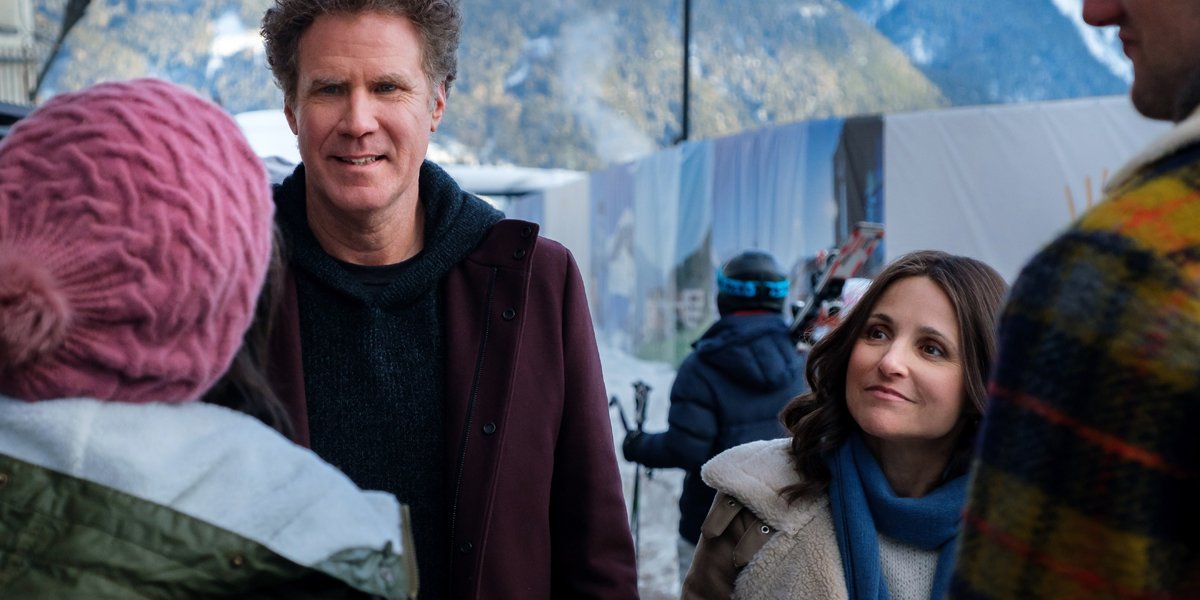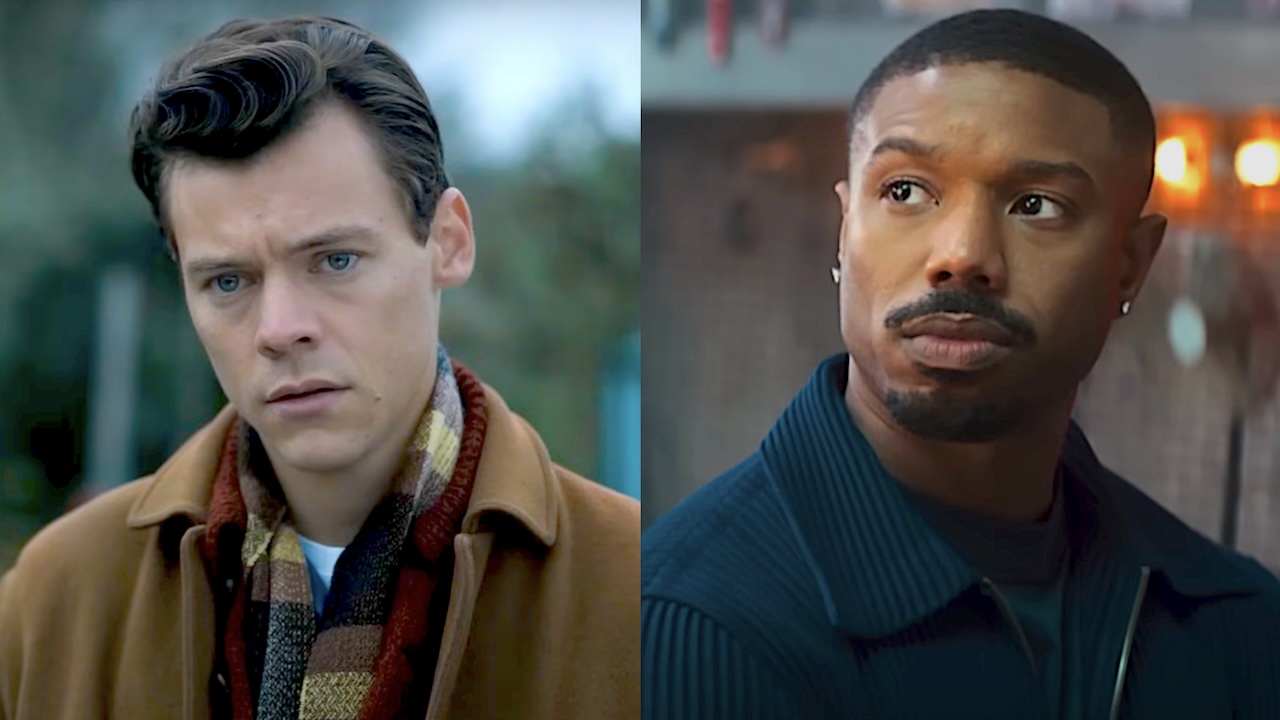Julia Louis-Dreyfus and Will Ferrell are two actors that audiences think they completely know. The former has spent decades delivering fantastic fierceness and sharp wit on the small screen making shows like Seinfeld and Veep, while the latter we recognize as one of modern cinemas great goofballs with a long string of blockbuster comedy hits. Because of their past work, there are certain expectations for whenever they show up on the big screen – but perhaps the only thing better than a performer delivering exactly what you expect is when they manage to sincerely surprise you.
That’s what we get in Jim Rash and Nat Faxon’s Downhill. While the film most definitely isn’t without its comedic moments, and features multiple scenes that inspire big bursts of laughter, what really stands out about it is the ability of Julia Louis-Dreyfus and Will Ferrell to do some excellent work with what is at times heavy and emotional material. The story demands very different things from their characters, but they are equally fascinating to watch and easy to relate to as they face a crisis that forces the audience to wonder how they might act in the same scenario.
Written by Jim Rash and Nat Faxon in collaboration with Jesse Armstrong, the film is a remake of Ruben Östlund’s Force Majeure – made with what can be described as more American sensibilities in its pacing and character construction. The story follows Billie (Julia Louis-Dreyfus) and Pete Staunton (Will Ferrell) as they take their twin sons (Julian Grey and Ammon Jacob Ford) for a ski vacation in the Alps, hoping to reconnect as a family. Unfortunately, events transpire that instead causes them to question what it is that they truly mean to each other.
Between ski runs, the family sits down for lunch on the patio of a restaurant, and gets a serious scare courtesy of one of the resort’s purposefully triggered avalanches. For a moment it seems like they are going to be totally wiped out by a wave of snow, and while Billie’s response is to hug her children and hope everything will be ok, Pete’s move is to grab his phone off the table and run like hell.
It turns out to be a non-issue, as things merely go full whiteout for a few seconds, but the Stauntons are still left with a bit of trauma from the shock and seeing the reaction of the paternal figure. As the vacation continues, tensions continue to escalate – particularly because of Pete’s denial that he’s done anything wrong.
Downhill strikes a great balance in tone, never going full comedy or full drama.
As evidenced by their Oscar-winning script for Alexander Payne’s The Descendants and their impressive directorial debut The Way, Way Back, Jim Rash and Nat Faxon have demonstrated an understanding that orchestrating a mix of heavy drama and silly and awkward comedy can have a special impact, and sharp talent is demonstrated here. Obviously a significant amount of the material is borrowed from Force Majeure, but the movie really does find a way to do its own thing even with the familiar set-ups.
The perfect example of this is what is arguably Downhill’s most vital scene, which sees Billie totally come clean about what she witnessed during the avalanche while having drinks with her husband, Pete’s friend from work, Zach (Zach Woods), and Zach’s girlfriend, Rosie (Zoe Chao) – who are on their own European vacation. In one moment you are emotionally struck listening to this harrowing account of what Billie registered as a near-death experience, and in the next the film is letting you bathe in the intense awkwardness that the story creates, which is its own special kind of funny.
Julia Louis-Dreyfus and Will Ferrell are excellent.
Pulling this off, of course, requires performers that can execute these varied tonal notes and possess the timing to pull it all off, and the movie is stacked with pros led by Julia Louis-Dreyfus and Will Ferrell. The word “harrowing” is not used lightly above, as Louis-Dreyfus does a remarkable job pulling the audience into her emotional moment, and there really is an added power that comes from being so used to laughing when you see her on screen. It’s far from her lone great scene in the movie, though, as she both plays with the turmoil of the situation throughout the story, while also getting her funny beats in (including a humorous bit of physical comedy as she aims to get some private relief in a public bathroom following a heated exchange with a ski instructor).
Will Ferrell’s performance is its own kind of fascinating, if not just because audiences are, to a certain degree, programmed to laugh at the actor in his most dramatic moments, as his tears more often than not are played for comedy. In Downhill, however, he’s playing with a totally different energy than normal, and it’s exciting to watch as a fan. Pete coming to an understanding of what his instincts made him do is an emotional journey by itself, and Ferrell impressively conveys that pain in what is one of his best more-serious performances.
Downhill makes some interesting alternative choices compared to Force Majeure, and most of them work.
Admittedly there isn’t a compelling argument made by Downhill as to why Force Majeure had to be remade, but the movie does notably have its own particular approach to the material. It’s not great when the new film directly copies certain sequences, and it’s noteworthy that the Rash/Faxon version takes a lot of subtlety out of the equation, but these are shortcomings that don’t ultimately undercut what’s fresh about the 2020 take and its other impressive qualities.
It wouldn’t be recommended to watch Force Majeure and then immediately go out and check out Downhill – but if you’ve never seen the former, or have a good bit of distance from it, you’ll be able to appreciate the most. It’s definitely a treat for fans of the performers and the filmmakers, and an entertaining film that is successfully emotional, funny, and thought-provoking simultaneously.

Eric Eisenberg is the Assistant Managing Editor at CinemaBlend. After graduating Boston University and earning a bachelor’s degree in journalism, he took a part-time job as a staff writer for CinemaBlend, and after six months was offered the opportunity to move to Los Angeles and take on a newly created West Coast Editor position. Over a decade later, he's continuing to advance his interests and expertise. In addition to conducting filmmaker interviews and contributing to the news and feature content of the site, Eric also oversees the Movie Reviews section, writes the the weekend box office report (published Sundays), and is the site's resident Stephen King expert. He has two King-related columns.











